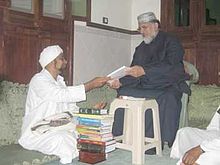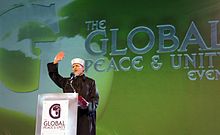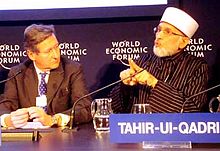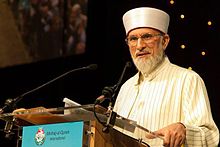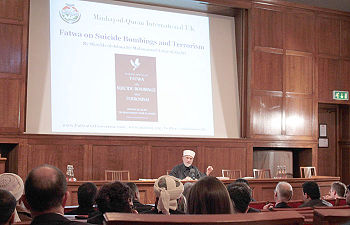- Tahir-ul-Qadri
-
Muhammad Tahir-ul-Qadri 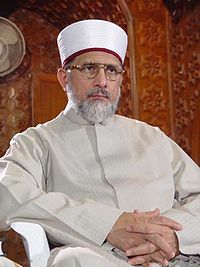
Full name Muhammad Tahir-ul-Qadri Born February 19, 1951 Region South East Asia School/tradition Qadiriyya Sufi Main interests Sufism, Islamic Philosophy, Hadith, Tafsir, Seerah, Tasawwuf, Politics[1] Notable ideas Fatwa on Terrorism, Concept of Jihad, interfaith dialogue Influenced by- Tahir Allauddin, Allama Iqbal, Shaykh ibn al-`Arabi, Jalal ad-Din Muhammad Rumi, Abdul-Qadir Gilani, Muhammad Alawi al-Maliki
Influenced- Shaykh As’ad Muhammad Saeed as-Sagharji, Shaykh Babikir Ahmed Babikir, Shaykh Abdul Hakim Murad[citation needed]
Muhammad Tahir ul-Qadri (Urdu: محمد طاہر القادری) (born February 19, 1951, Jhang, Pakistan) is a Pakistani Sufi scholar and former professor of international constitutional law at the University of the Punjab.[2]
Qadri is the founder of Minhaj-ul-Quran International, a broad-based global Sufi organization[3] working in the fields of welfare, human rights and education. Its objectives are the promotion of a moderate and non-extremist vision of Islam, the establishment of good relations and understanding between communities and religions,[4] and the education of youth through "employing the methods of Sufism".[5] He also founded The Minhaj University of which he is the head of the Board of Governors, as well as an international relief charity, Minhaj Welfare Foundation.[6]
Qadri is also the founding chairman of the political party Pakistan Awami Tehreek (PAT), although he is no longer involved in politics. Qadri spoke at the World Economic Forum in January 2011.[7]
Contents
Biography
Qadri is the son of Farid-ud-Din Qadri and his ancestors belong to the Sial family of Jhang near Sargodha.[8] Qadri started his education at the Christian 'Sacred Heart School' in Jhang, a Catholic mission school, where he learnt English and was exposed to Christianity at an early age. He was specifically taught Islamic education from the age of 12[9] in al-Madina al-Munawwara, Saudi Arabia at the Madrasa al-‘Ulum al-Shar‘iyya[10], which was situated in the house of Abu Ayyub al-Ansari, the first residence of the Islamic Prophet Muhammad after his migration to Madinah.[11] He learnt under Mawlana Diya' al-Din al-Madani (d. 1981, aged 107) and studied Hadith from Muhaddith al-Hijaz al-Sayyid ‘Alawi ibn ‘Abbas al-Maliki al-Makki (d. 1971). Al-Shaykh al-Sayyid ‘Alawis son, the late muhaddith of al-Hijaz, al-Sayyid Muhammad ibn ‘Alawi al-Maliki al-Makki (d. 2004) who was the foremost Sunni authority of the Middle East[citation needed] gave all of his fathers ijazas and isnads to Qadri in written form which he had previously received verbally, as well as his own chains.[12] Qadri continued his quest for knowledge early in his life, making sama‘[13] of Hadith from the then Muhaddith al-A‘zam of Pakistan, Sardar Ahmad al-Qadri (d. 1962)[14]. He also learnt from a number of other prominent classical authorities in the Islamic sciences such as the following scholars:
- Al-Sayyid Abu al-Barakat Ahmad al-Qadri al-Alwari (d. 1978). One of the hadith narrators of the Sub-Continent, he is the son of al-Sayyid Didar ‘Ali al-Shah al-Alwari (student of al-Shaykh Ahmad ‘Ali al-Muhaddith al-Saharanpuri) and was a student of Ahmed Raza Khan Barelvi. Qadri studied under him for four years and was gifted all of the Shaykhs ijazas in Hadith and Fiqh in 1972.[15]
- Ustadh al-‘Ulama’ al-‘Allama ‘Abd al-Rashid al-Ridwi (d. 2011). Qadri completed the classical Dars-e-Nizami course with him from 1963 to 1970 at Jami‘a Qutbiyya Ridwiyya, Jhang[16]. Lessons were conducted from the predawn ''Tahajjud'' prayers at three o’clock in the early morning to eleven o’clock at night with pauses between noon and afternoon. No other student was taught while he was engaged in coaching Qadri. In 2007, he attended the birthday gathering of Qadri and whilst praising his talents and achievements, said:
- “Today we are lucky to be present here in connection with the birthday of a true lover of the Holy Prophet. I started teaching Shaykh-ul-Islam when he was very young but I never saw him missing his (predawn) ''Tahajjud'' and other optional(prayers)... Let alone speaking of neglecting a lesson or going absence, he never even imagined such a thing. As a student he was deeply loyal to me. The world has rewarded him by bestowing upon him the title of Shaykh-ul-Islam. Dr Sahib was a person of great humility and this quality exists in him even today and has not lessened even a little. All of this is divine grace and favour upon him. I pray to Allah for his long life and success in the Mustafawi mission.”[17]
- Tahir Allauddin al-Qadri al-Gilani (d. 1991). A well-known Sufi-saint became Qadri’s spiritual guide in the Qadiriyya Tariqa in 1966. He also bestowed him with all of his ijazas in Hadith.[18] Tahir Allauddin opened The Minhaj University[19] saying that anyone opposing the Minhaj-ul-Quran institute would have no relationship with the Qadiriyya movement and their deeds would not benefit Islam (see scan oppersite).
- Al-Shaykh Ahmad al-Zubaydi (whose father’s standing was such that he was known as Abu Hanifa al-Saghir)[citation needed] of Syria who is allegedly from the family of Imam al-A‘zam Abu Hanifa reports that he personally heard Tahir Allauddin al-Gilani referring to Tahir Qadri as “Mujaddid (Reviver of Islam)”.[20]
 Letter of Sayyiduna Tahir Allauddin al-Qadri al-Gilani written in honour and defence of Qadri superimposed on a photo of both of them together published in Minhaj-ul-Quran Monthly.
Letter of Sayyiduna Tahir Allauddin al-Qadri al-Gilani written in honour and defence of Qadri superimposed on a photo of both of them together published in Minhaj-ul-Quran Monthly.
- Sayyiduna al-Shaykh ‘Abd al-Ma‘bud al-Jilani (d. 1985) who had himself taken knowledge and training directly from many scholars and saints such as al-‘Arif Billah al-Shah Haji Imdadullah al-Muhajir al-Makki, Imam al-Hind Mawlana al-Shah Ahmad Rida Khan al-Barelwi, Qutb al-‘Arifin Sayyiduna ‘Ali bin Sulayman ibn Mustafa’ al-Naqib al-Baghdadi, his father Imam al-Muhaddithin al-Shaykh ‘Abd al-Rahman al-Mahd al-Naqib al-Baghdadi, al-‘Arif Billah al-Shah Muhammad Sulayman Tonswi (successor of Qutb al-‘Arifin al-Shaykh Nur Muhammad al-Muharwi) and al-Shaykh al-‘Allama Fadl al-Haqq al-Khayrabadi.[21]
- Al-‘Allama al-Muhaqqiq al-Musnid Dr. Farid al-Din Qadri (d.1974), the father of Qadri was also a top-notch scholar who had acquired knowledge from the centres of learning at al-Hijaz, Lucknow, Delhi, Hyderabad (India), Baghdad, Damascus among other places. He gained knowledge from many of the leading scholars of his time such as Muhaddith al-Haram al-Makka al-Imam ‘Alawi ibn ‘Abbas al-Maliki, al-Shaykh Muhammad ‘Abd al-Shakur al-Muhajir al-Madani (student of al-Shaykh Ahmad ‘Ali al-Muhaddith al-Saharanpuri and once teacher at Dar al-‘Ulum Deoband before leaving it for al-Madina al-Munawwara), al-Shaykh ‘Abd al-Hadi al-Ansari al-Laknawi, al-Shaykh ‘Abd al-Baqi ibn ‘Ali Muhammad al-Ansari al-Muhaddith al-Laknawi (student of al-Imam Abu al-Hasanat ‘Abd al-Hayy ibn ‘Abd al-Halim al-Muhaddith al-Ansari al-Laknawi and many other great scholars), al-Shaykh al-Sayyid Muhammad al-Makki ibn Ja‘far al-Kattani and al-Muhaddith al-Musnid al-Shaykh Muhammad Sardar Ahmad al-Qadri al-Chishti. He taught Qadri everyday from 1962 to 1970 and periodically from 1970 till 1974. This included the principles of Hadith, Fiqh, Tafsir, ‘Aqida, Tasawwuf, Nahw, Balagha, Logic, Philosophy and Arabic literature as well as many other traditional classical sciences. He awarded Qadri with the Dawra al-Hadith certification in 1970.[22]
- Al-Muhaddith al-Musnid al-Sayyid Ahmad Sa‘id al-Kazmi al-Amrohi (d. 1986). A famous authority of Pakistan who was known as the "Ghazali of his Time" was a close friend of Qadris father, al-Musnid Dr. Farid al-Din al-Qadri. Qadri studied under him at Jami‘a Islamiyya, Bahawalpur as well as in his own institution Anwar al-‘Ulum in Multan. These studies included Hadith, ‘Aqida, ‘Ilm al-Kalam and other classical sciences. Upon completion of his studies, a special certification, Sanad-e-Hadith was awarded in 1979.[23]
- Al-Muhaddith al-Musnid al-Shaykh Husayn ibn Ahmad ‘Usayran (d. 2005). He was the last living student of the famous Lebanese authority, al-Imam Yusuf ibn Isma‘il al-Nabhani and gave Qadri all of his ijazas in 2004, a year before he passed away. He had gained knowledge from some of the topmost authorities in Hadith and Fiqh from the Middle East and North Africa.[24]
- Al-Shaykh al-Sayyid Muhammad Fatih al-Kattani, the Muhaddith al-A‘zam of Syria from whom Qadri learnt in Damascus and gained all his ijazas.[25]
- al-Ustadh Dr. Burhan Ahmad al-Faruqi (d. 1996) who was a famous student of al-‘Allama al-Sayyid Zafar al-Hasan ‘Uthmani and student and khalifa (spiritual successor) of al-Shaykh Muhammad Sulayman Ashraf ‘Aligarhi who in turn was a khalifa of Imam al-Hind Mawlana al-Shah Ahmad Rida Khan. Under him, Qadri learnt the philosophical reflections of Mufakkir al-Islam al-‘Allama Dr Muhammad Iqbal under his guidance and also received all of his ijazas.[26]
He studied law at the University of the Punjab, Lahore where he graduated with an LLB in 1974, gaining a Gold Medal for his academic performances.[27] Following a period of legal practice as an advocate, he taught law at the University of the Punjab from 1978 to 1983 and then gained his PhD in islamic Law (Punishments in Islam, their Classification and Philosophy) from the same university in 1986 where his supervisors were Professor Dr. Bashir Ahmad Siddiqui (‘Ulum al-Islamiyya) and Justice Javaid Iqbal[28].[29][30] He was appointed as a professor of Law at the University of Punjab, where he taught British, US and Islamic constitutional law.[31]Qadri was appointed as a Jurist Consultant (legal adviser) on Islamic law for the Supreme Court and the Federal Shariat Court of Pakistan and also worked as a specialist adviser on Islamic curricula for the Federal Ministry of Education (Pakistan). At various times between 1983 and 1987, he received and declined offers for various high-level posts.[citation needed]
He has delivered more than 6,000 lectures on economy and political studies, religious philosophy, law, Sufism, medical sciences, material sciences and astronomy. Numerous lectures are available in Urdu, English and Arabic at Islamic bookshops around the world.[32][33][34]
Qadri has himself given ijaza to a number of leading Muslim scholars, making them his students, linking them through himself back to Muhammad.[35][36]
Founding of Minhaj-ul-Quran
Main article: Minhaj-ul-Quran InternationalQadri founded a Sufism-based organisation Minhaj-ul-Quran International in October 1981 and spent the next decade expanding it nationally and internationally.[37] In 1987, the headquarters of Minhaj-ul-Quran, based in Lahore, Pakistan was inaugurated by Sufi saint Tahir Allauddin who is now regarded as the organisation's spiritual founder.[38] The goal of the organisation is fairly broad, namely to promote religious moderation, effective and sound education, inter-faith dialogue and harmony, and a moderate interpretation of Islam employing methods of Sufism.[39] Over the past 30 years, the institute has reportedly expanded to over 90 countries.
Noteworthy Events
In 2006, Qadri was a keynote speaker at the Muslims of Europe Conference in Istanbul, Turkey to discuss identity, citizenship, and challenges and opportunities for European Muslims.[40]
On 31 August 2008, Qadri delievered a lecture entitled "Islam on Peace, Integration and Human Rights" hosted by Farghana Institute Manchester.[41]
In March 2010 he gained media attention for the launch of his unconditional Fatwa on Terrorism and appeared on various international media outlets including Sky News, BBC News, ITV, EuroNews, Al-Jazeera, CNN and CNN's Amanpour, CBC News, Russia Today, Al Arabiya and various other outlets.[42] He appeared on Frost Over The World and interviewed by Sir David Frost in which Qadri stated that the "purpose of his life is to bring peace and harmony in the world".[43] Furthermore, the US State Department declared the Fatwa to be a significant publication which takes back Islam from terrorists.[44]
Qadri was quoted in the American Foreign Policy magazine stating: "I am trying to bring [the terrorists] back towards humanism. This is a jihad against brutality, to bring them back towards normality. This is an intellectual jihad."[45]
In August 2010 Qadri held the first anti-terrorism camp for Muslim youth at the University of Warwick with the aim of tackling extremism in the UK.[46] The camp was organised by his organisation Minhaj-ul-Quran UK[47] which has established 572 schools, a number of colleges and a chartered university.[48]
Global Peace and Unity
On 24 October 2010, Qadri was invited to deliver a speech entitled "Jihad: Perception and reality" to a gathering of thousands of British Muslims at the largest European multicultural gathering, the Global Peace and Unity event.[49] Qadri stated in his speech: "Let me make it very clear and sound, let me remove any ambiguity that no leader or a group has any authority to declare jihad. If any leader or a group does that, it is terrorism and not jihad." He added: "it is solely the prerogative of a state authority to declare jihad and only as a matter of last resort when diplomacy and all other efforts to make peace have failed."[50]
US Institute of Peace
On 10 November, 2010, Qadri delivered a lecture on "Islamic Concept of Jihad" at the US Institute of Peace, a prestigious think-tank.[51] The audience comprised senior scholars, doctors, professors, engineers, policy makers and opinion leaders etc.[52]
World Economic Forum
In January 2011, Qadri was invited to speak at the World Economic Forum in Davos on the topic of "The Reality of Terrorism".[53]
U.S. Islamic World Forum
In April 2011, Qadri was invited to speak at the U.S. - Islamic World Forum which was jointly organized by the Brookings Institution, Qatar Government and the OIC, where he spoke on issues such as integration and identity, the impact of media and politics, security and counter-terrorism, the treatment of minorities, and interfaith relations.[54][55][56] In July 2011, he gave a lecture on the issues of terrorism and integration at the Parliament of New South Wales in Sydney, Australia where he was invited by the member of the NSW Legislative Council, the Hon. Shaoquett Moselmane MLC. The audience at the lecture comprised members of the NSW Legislative Council, ministers, politicians, policy makers, senior scholars and religious leaders, etc.[57] On 19 July 2011 Qadri appeared on NEWS LINE Australia Network where he discussed terrorism and possible troop withdrawals from Afghanistan.[58] On 23 July 2011, Qadri appeared on SBS ONE TV and cautioned Western governments about their "aid and anti-terror funding"[59]
Peace for Humanity Conference
On 24 September 2011, Minhaj-ul-Quran convened the "Peace for Humanity Conference" at Wembley Arena in London where Tahir-ul-Qadri and the assembled speakers issued a declaration of peace on behalf of religious representatives of several faiths, scholars, politicians, and 12,000 participants present from various countries. This conference was endorsed by, or received supportive messages from, the Grand Imam of Al-Azhar University, Ban Ki-Moon (Secretary General of the United Nations), Ekmeleddin Ihsanoglu (Secretary General of the Organisation of Islamic Cooperation), David Cameron (British Prime Minister), Rowan Williams (Archbishop of Canterbury) and others.[60][61]
Views
Extremism & Terrorism
Qadri argues that terrorists have left the true, classical teachings of Islam and that their rebellious spirit of violence and religious extremism is a continuity of the Khawarij.[62] Qadri was one of the religious leaders in Pakistan to condemn the terrorist attacks on September 11, 2001. He has denounced and severely condemned Osama bin Ladin.[63]
Qadri describes terrorism as an "ideological infection"[64] and believes that, through his anti-terrorism summer camps, "we are fighting on the ideological, philosophical, theological and academic fronts. We are trying to educate young people."[65]
Reuters featured Qadri in August 2009 as a leading Sufi scholar who is working to bring the western youth away from extremism towards moderate Islam and to combat extreme tendencies.[66]
After the December 2009 Rawalpindi attack he was quoted as saying: "Suicide attacks are not allowed in Islam, these actions are un-Islamic, The slaughter of human beings in any religion or country, and terrorism in all its manifestations, are totally in contradiction with the teachings of Islam."[67] The same view is also held by the majority of mainstream (non-Sufi) Muslims[68] based on the teachings of the Qur'an 5:32.
Division of the World
Qadri refutes the division of the world into two categories Dar al-Islam (the abode of Islam) and Dar al-harb (the abode of war) and that the west is the latter;[69]Qadri instead divides the world into five categories.[70] Qadri argues that the word "Dar al-Islam" actually implies "the abode of Peace" rather than the abode of Islam and that all countries under the United Nations (UN), whether Muslim or non-Muslim actually come under Dar al-Ahad (house of treaty) which Qadri says is the same as Dar al-Islam.[71]
In his 2010 anti-terrorism summer camp in Britain, Qadri further commented on the issue saying,
“ All these Western countries - Britain, Europe, North America, wherever you are living - since you are enjoying all rights, all freedoms according to the constitution as other non-Muslim communities are enjoying, there is no difference. And I would have no hesitation in saying you are enjoying the rights and freedoms much better than in many other Muslim and Arab countries.[72] ” —Tahir-ul-Qadri
Muhammad Cartoon Controversy
He expressed concern when cartoons depicting the Prophet Muhammad were published in newspapers around Europe and sent out a memorandum called 'A call to prevent a clash of civilizations'.[73][74][75]
Fatwa on Terrorism
On 2 March 2010, Qadri issued a 600-page Fatwa on Terrorism, which is an "absolute" scholarly refutation of all terrorism without "any excuses or pretexts." He said that "Terrorism is terrorism, violence is violence and it has no place in Islamic teaching and no justification can be provided for it, or any kind of excuses or ifs or buts." Qadri said his fatwa, which declares terrorists and suicide bombers to be unbelievers, goes further than any previous denunciation.[76]
The US Congress funded think-tank United States Institute of Peace hosted Qadri in November 2010 to speak about his struggle against radicalism in Islam in light of his Fatwa on Terrorism.[77]
The Fatwa on Terrorism has been officially endorsed by Al-Azhar University in Cairo, Egypt.[78][79]
Qadri states in his Fatwa on Terrorism:
“ The importance Islam lays on the sanctity and dignity of human life can be gauged from the fact that Islam does not allow indiscriminate killing even when Muslim armies are engaged in war against enemy troops. The killing of children, women, the old, infirm, religious leaders and traders is strictly prohibited. Nor can those who surrender their arms, confine themselves to their homes and seek shelter of anyone be killed. The public cannot be massacred. Likewise, places of worship, buildings, crops and even trees cannot be destroyed. On the one hand, there is a clear set of Islamic laws based on extreme discretion, and on the other, there are people who invoke the name of Islam to justify the indiscriminate killing of people, children, and women everywhere, without any distinction of religion or identity. It is a pity that such barbaric people still refer to their activities as Jihad. There can be no bigger discrepancy than this to be seen on earth. It can in no way be permissible to keep foreign delegates under unlawful custody and murder them and other peaceful non-Muslim citizens in retaliation for the interference, unjust activities and aggressive advances of their countries. The one who does has no relation to Islam and the Holy Prophet (blessings and peace be upon him).[80] ” —Tahir-ul-Qadri, Fatwa on Terrorism
Burning of Qur'an
On 9 September 2010, Qadri wrote a letter to the U.S. President Barack Obama in response to the controversial 'Burn a Quran Day' urging him to stop this incident from happening.[81] Qadri wrote in an article published on the CNN website: "If this event had gone ahead it would not be less than 9/11 in the sense of far-reaching consequences and after-effects." he added: "A handful of individuals, it does not matter whether they are related to mosque or church, cannot be given the right to flippantly play about with peaceful co-existence, and their so-called sentiments cannot be preferred over global peace."[82]
Islamic State
Qadri views an Islamic state as a Muslim-majority country which respects freedom, the rule of law, global human rights (including religious freedom), social welfare, women's rights and the rights of minorities.[83]
He also claims that the Constitution of Medina "declared the state of Madinah as a political unit". He also mentions that the Constitution declared the "indivisible composition of the Muslim nation (Ummah)".[84]
With respect to the Constitution of Medina, Qadri says: "This was the constitution, which provided the guarantee of fundamental human rights in our history." He believes that "a constitution is a man-made law and by no means it can be declared superior to a God-made law."[84]
He believes in the Sovereignty of God’s law, that the Qur'an and Sunnah equates to State law, and that Islam encourages political activity. Qadri sees Islam as a faith which allows political participation. He believes in democracy and human rights, and argues that rights are defined in Islam by the Qur'an and Sunnah.[citation needed]
Published Works
He has authored some 400 published works in Arabic, English and Urdu.[85][86] Amongst his recent works are:
- “Muqaddima Sira al-Rasul(saw)” is an introduction to his 14 volume Sira of the Prophet Muhammad.[87][88]
- “Imam Abu Hanifa: Imam al-A’imma fi al-Hadith” This work argues that Imam Azam Abu Hanifa is the Imam of Hadith of all imams of Hadith including Imam Bukhari, Imam Muslim, Imam Tirmidhi, Imam Abu Dawud, Imam Nasa’i etc.[89]
- “Dala’il al-Barakat” (10,000 Durood and Salawat in praise of Muhammad, written in the style of the well-read Dala’il al-Khayrat of Imam Jazuli, which was written nearly 1,000 years ago).
- “Kitab al-Tawhid’”(a detailed treatise on the concept of the unity of Allah) consisting of 2 large volumes.[90]
- “Minhaj al-Sawi’” (A Hadith compendium in 2 volumes compiled in the pattern and style of Imam Nawawi’s “Riyad al-Salihin رياض الصالحين” and Khatib Tabrizi’s “Mishkat al-Masabih” Consisting of approximately 1,000 pages).
- “Mawlid al-Nabi”, the largest ever written work[citation needed] on the subject of Mawlid, consisting of approximately 1,000 pages.
The income from Qadri’s published books and DVDs and CDs of his lectures goes to his organisation Minhaj-ul-Quran International.[91]
English works include:- Fatwa on Terrorism and Suicide Bombings[92]
- Irfan ul Quran (Modern and Scientific English translation of the Quran) renamed to The Glorious Qur'an[93]
- Beseeching for Help[94]
- Peace, Integration and Human Rights[95]
- Ijtihad (meanings, application and scope)[96]
- Creation of Man[97]
- Islamic Concept of Human Nature[98]
- Islam and Criminality[99]
- Pearls of Remembrance[100]
- Islam on Prevention of Heart Diseases[101]
- Islamic Concept of Intermediation[102]
- The Constitution of Madina (First ever written constitution)[103][104]
- Islamic Concept of Knowledge (Al Ilm)[105]
- Spiritualism and Magnetism[106]
- Creation and Evolution of the Universe[107]
- Islam and Freedom of Human Will[108]
- Islamic Concept of Law[109]
- Greetings and Salutations on the Prophet[110] (صلى الله عليه و آله وسلم)
- Islam and Politics
- The Islamic State (True Concept and Eradicating Misconceptions (Khilafah))[111]
- The Ghadir Declaration[112]
- Virtues of Sayyedah Fatimah[113]
- Imam Bukhari & the Love of the Prophet[pbuh] (Al-Hidayah Series)[114]
Political career
Main article: Pakistan Awami TehreekOn May 25, 1989, Qadri founded a political party Pakistan Awami Tehreek or PAT. The main aims of this political party are to introduce the culture of true democracy, economic stability, improve the state of human rights, justice and the women's role in Pakistan. The PAT also aims to remove corruption from Pakistani politics. Its official website contains its formal manifesto.[115]
In 1990, Pakistan Awami Tehreek (PAT) participated in the national elections just one year after it was founded. In 1991, PAT and TNFJ (Tehreek-e-Nifaz-e-Fiqh-e-Jafria A shia political group ) now known as Tehreek-e-Jafria[116] signed a 'Communique of Unity' in order to promotes social and religious harmony. In another creative move, PAT for the first time in the political history of Pakistan, introduced an idea of "working relationship" between the three national political forces, PAT, TNFJ and Tehreek-e-Istaqlal.
From 1989 to 1993, Qadri continuously worked as an opposition leader tying to indicate the government's mistakes and to suggest ways for improving the situation in the political, educational, and economical fields. In 1992 he presented a complete working plan for interest-free banking in Pakistan covering all kinds of national and international transaction which was recognized and appreciated by all sections of the society including industrial and banking professionals. PAT offices were also opened in major foreign countries.[117]
Qadri continued his research alongside his political career and, in 1996, he presented a thesis on the utilization of an observatory for moon sighting based on the more recent scientific findings.[118]
He was elected as an MNA (Member of the National Assembly) of his Lahore constituent on the Pakistani National Parliament. On 29 November 2004, Qadri announced his resignation as a Member of the National Assembly.[119] Explaining his resignation he cited the President's broken promises, political corruption and blackmailing, the undemocratic system, institutional inabilities, failures of accountability, the sabotage of National Assembly, global issues including Pakistan-US relations, international terrorism and US global domination, Israeli aggression, the Iraq war, Islamabad-Delhi relations including the Kashmir dispute and Pakistan-Afghanistan relations. His 41-page resignation statement is available online to read.[120]
In a January 2011 address to a meeting of MQI’s Majlis-e-Shura in Lahore, Qadri stated that the current political system of Pakistan protects a 3% ruling elite, while the 97%, who are mainly poor people, have effectively become slaves of this corrupt political system.[121][122]
Qadri is still influential in Pakistani politics, on October 06, 2011, Supreme Court of Pakistan ordered action on Karachi violence after the Chief Justice of Pakistan Iftikhar Muhammad Chaudhry took a suo motu notice on the appeal of Dr Tahir ul Qadri.[123][124]
See also
- Minhaj-ul-Quran International
- Qadiriyya Sufi Order
- Fatwa on Terrorism
- Minhaj us Sawi
- The Amman Message
- Contemporary Islamic philosophy
- London Declaration for Global Peace and Resistance against Extremism 2011
References
- ^ Tahir-ul-Qadri's biography
- ^ Qadri teaches his followers the Sufi dance
- ^ Minhaj-ul-Quran - Sufi organisation
- ^ Merry Christmas Interfaith Festival
- ^ Minhaj-ul-Quran - Sufi organisation
- ^ Minhaj Welfare Foundation
- ^ Qadri at 2011 World Economic Forum
- ^ Famous Jhangvian!
- ^ Qadri, http://youtube.com/watch?v=t2f7DxLnQ4w.
- ^ Qadri, http://youtube.com/watch?v=t2f7DxLnQ4w.
- ^ Bukhari, al-Sahih, Kitab: Manaqib al-Ansar, Bab: Maqdam al-Nabi (s) wa As-habihi al-Madina, 5:67, #3932.
- ^ Al-Sayyid Muhammad ‘Alawi al-Maliki al-Makki, al-Nur al-Bahir fi Ijaza al-Allama al-Shaykh Muhammad Tahir (1991).
- ^ Sama‘: The Ulema have stipulated eight methods for the transmission and reception of hadith, of which direct listening (al-sama‘) from a Shaykh, reciting before the Shaykh (al-qira’a) and receiving permission (al-ijaza) are but a few examples.
- ^ Qadri, al-Jawahir al-bahira fi al-asanid al-tahira, p. 27.
- ^ Qadri, al-Jawahir al-bahira fi al-asanid al-tahira, p. 24.
- ^ http://www.irfan-ul-quran.com/quran/english/tid/41/
- ^ Speech by Ustadh al-‘Ulama’ al-‘Allama ‘Abd al-Rashid al-Ridwi, http://www.youtube.com/watch?v=flop4--7Qy0.
- ^ Qadri, al-Jawahir al-bahira fi al-asanid al-tahira, p. 23.
- ^ Opening of The Minhaj University by Tahir Allauddin al-Qadri
- ^ Ahmad al-Zubaydi, http://video.google.co.uk/videoplay?docid=4831100359231050500&q=dr+tahir
- ^ Qadri, al-Jawahir al-bahira fi al-asanid al-tahira, p. 24.
- ^ Qadri, al-Jawahir al-bahira fi al-asanid al-tahira, p. 24.
- ^ Qadri, al-Jawahir al-bahira fi al-asanid al-tahira, p. 27.
- ^ Qadri, al-Jawahir al-bahira fi al-asanid al-tahira, p. 29.
- ^ Qadri, al-Jawahir al-bahira fi al-asanid al-tahira, p. 29.
- ^ Qadri, al-Jawahir al-bahira fi al-asanid al-tahira, p. 29.
- ^ [1]
- ^ Qadri, http://youtube.com/watch?v=EsUdM6GcJbY
- ^ Ph.D in Islamic Law Higher Education Commision
- ^ [2]
- ^ A Profile of Muhammad Tahir-ul-Qadri
- ^ Hundreds of lectures of Tahir-ul-Qadri available to download
- ^ Online book shop with many English and Urdu DVD's and CD's of Tahir-ul-Qadri
- ^ Reference
- ^ Shaykh Habib Umer receives Ijazaat from Tahir-ul-Qadri
- ^ Ijazah given by Tahir-ul-Qadri
- ^ Minhaj-ul-Quran - a Sufi-based organisation
- ^ Qadiriyya sufi saint Tahir Allauddin - spiritual founder of Minhaj-ul-Quran
- ^ Mihaj-ul-Quran - a Sufi-based organisation
- ^ About Shaykh-ul-Islam
- ^ Islam on Peace Integration & Human Rights
- ^ TV Coverage of Fatwa on Terrorism
- ^ [3]
- ^ Muslim leader's edict decries terrorism: U.S. hails 'taking back Islam'
- ^ Sheikh to Terrorists: Go to Hell
- ^ Muslim summer camp preaches 'anti-terror' message
- ^ Muslim group Minhaj ul-Quran runs 'anti-terrorism' camp
- ^ [4]
- ^ Tahir-ul-Qadri to deliver speech at 2010 Global Peace and Unity event
- ^ [5]
- ^ Qadri speaks at the American Institute of Peace
- ^ Tahir-ul-Qadri’s Struggle Against Radicalism in Islam
- ^ Indian Express
- ^ Participants of U.S.-Islamic World Forum
- ^ Tahir-ul-Qadri at U.S.-Islamic World Forum
- ^ Muslim Scholar to Present Solution to Counter Home-Grown Terrorism and Islamophobia at U.S. Islamic World Forum
- ^ Tahir-ul-Qadri at NSW Parliament House in Sydney, Australia
- ^ Interview With Jim Middleton News Line Australia
- ^ SBS TV Interview with Tahir-ul-Qadri
- ^ [6]
- ^ [7]
- ^ Fatwa on Terrorism by Tahir-ul-Qadri | Page 41
- ^ Prominent Muslim Cleric Denounces bin Laden
- ^ Ridgwell, Henry (2010-08-08). "Muslim group holds 'anti-terrorism' summer camp". Guardian News and Media. http://www.guardian.co.uk/world/2010/aug/08/muslim-anti-terrorism-camp.
- ^ "Anti-Terrorism Summer Camp Held In Britain". VOAnews. Voice of America. 2010-08-13. http://www1.voanews.com/english/news/europe/Anti-Terrorism-Summer-Camp-Held-In-Britain-100649109.html.
- ^ Muslim Camp draws teens to Combat extremism
- ^ In Pakistan, anguish and questions, The Washington Post, 2009-12-6
- ^ Fatwa on suicide and on praying for one who has committed suicide
- ^ Division of Abodes
- ^ Qadri divides the World into five categories
- ^ Dar al-Harb (Abode of war) & Dar al-Islam (Abode of Islam)
- ^ Anti-Terrorism Summer Camp Held In Britain
- ^ A call to prevent a clash of civilizations by Muhammad Tahir ul Qadri
- ^ [8]
- ^ [9]
- ^ Top Islamic scholar issues 'absolute' fatwa against terror
- ^ Tahir-ul-Qadri’s Struggle Against Radicalism in Islam
- ^ Al-Azhar University Certification
- ^ Al-Azhar University Certification
- ^ [10]
- ^ Archbishop of Canterbury joins 'Koran burning' critics
- ^ Quran burning legacy would have lasted generations
- ^ Islam and Politics
- ^ a b The Constitution of Madina
- ^ Books of Dr. Tahir ul Qadri to Read Online
- ^ Online Store with Dr. Tahir ul Qadri's Urdu, English and Arabic Books
- ^ prologue on Biography of Muhammad
- ^ Muqaddima-tus-Sirah ar-Rasul(Vol 1)
- ^ Imam Abu Hanifa:Imam al-A’imma fi’l-Hadith
- ^ Kitab at-Tawhid
- ^ Notice of his income towards MQI in his book Creation of man page 1
- ^ Sacred Boundaries: A Historical Fatwa on Terrorism
- ^ Irfan-ul-Quran
- ^ Beseeching for Help
- ^ Peace, Integration and Human Rights
- ^ (meanings, application and scope)
- ^ Creation of Man
- ^ Islamic Concept of Human Nature
- ^ and Criminality
- ^ Pearls of Remembrance
- ^ Islam on Prevention of Heart Diseases
- ^ Islamic Concept of Intermediation
- ^ The Constitution of Madina
- ^ [11]
- ^ Islamic concept of knowledge
- ^ Spiritualism and Magnetism
- ^ Creation and Evolution of the Universe
- ^ Islam and Freedom of Human Will Islam and Freedom of Human Will
- ^ Islamic Concept of Law
- ^ Greetings and Salutations on the Prophet (صلى الله عليه و آله وسلم)
- ^ The Islamic State
- ^ The Ghadir Declaration
- ^ Virtues of Sayyedah Fatimah
- ^ Imam Bukhari and the Love of the Prophet [pbuh (Al-Hidayah Series)]
- ^ Manifesto of Pakistan Awami Tehreek
- ^ Tehrik-e-Nifaz-e-Fiqa-e-Jafria
- ^ working plan for interest free banking
- ^ Moon Visibility & Sighting of the Crescent Moon
- ^ Qadri sends 41-page resignation to speaker
- ^ Statement of Resignation from The National Assembly
- ^ Present system backs powerful elite
- ^ Tahir ul Qadri condemns governing setup
- ^ Present system backs powerful elite
- ^ Pak court orders action on Karachi violence
External links
- Minhaj-ul-Quran Research Institute
- Translation of the Holy Quran in English & Urdu
- by Minhaj Ul Quran International- drtahirulqadri.com
- Online Quran Project includes the English and Urdu Qur'an translation by Tahir al-Qadri.
- Books by Tahir ul Qadri to Read Online
- Speeches by Tahir ul Qadri to Play & Download
- The Official Website of Minhaj-ul-Quran
- Minhaj Encyclopedia (Urdu)
- Tahir ul-Qadri's Legal Opinion against Terror: Fatwa Falls on Deaf Ears
- Correct Islamic Faith International Association (CIFIA)
- Fatwa on Suicide Bombings and Terrorism by Qadri
- Downloadable lectures by Qadri
Sufism and Tariqah Ideas Practices Sufi orders - Alians
- Ba 'Alawi
- Bayramī
- Bektashī
- Chishtī
- Ḥurūfī
- Khalwatī
- Malāmatī
- Mevlevī
- Murīdi
- Naqshbandi
- Ni'matullāhī
- Qadirī
- Qalāndārī
- Rifa'i
- Safāvī
- Shadhili
- Suhrawardī
- Tijanī
- Zahediyeh
Notable Early
Sufi Saints
and Mystics- Abul-Khayr
- Ahmad Ghazālī
- Al-Ghazālī
- al-Gilanī
- Al-Hallaj
- al-Qunawi
- al-Sinjanī
- Amīr Kulal
- Ardabili
- Ata Allah
- Attar
- Balım Sultan
- Bande Nawāz
- Baqī Billah
- Bastami
- Bayram
- Bektaş
- Bhita'i
- Bulleh Shah
- Dehlāvī
- Farīd ūd-Dīn
- Gālib
- Gharīb Nawāz
- Ghujdawanī
- Ghulam Farīd
- Haddad
- Hamadānī
- Hansvi
- Hasan Basri
- Haydar
- Hudayi
- Hujwiri
- ibn ʿArabī
- Jami
- Jānān
- Jazoulī
- Junayd Baġdādi
- Kākī
- Kaliyarī
- Karkhi
- Kharaqanī
- Kūbra
- Misrī
- Nāimī
- Naqshband
- Nasīmī
- Nurī
- Ni'matullāh
- Nizām ūd-Dīn
- Pir Sultan
- Rabbānī
- Rabia Basri
- Rifa'ī
- Rukn-e-Alam
- Rūmī
- Saadi
- Sanai
- Semnani
- Shadhili
- Shahāb ād-Dīn
- Shibli
- Shirazī
- Sultan Walad
- Tabrizī
- Najib al-Suhrawardī
- Umar al-Suhrawardī
- Yasavī
- Yunus Emre
- Zakariya
- Zarruq
Notable Modern
Sufi Saints- Auliya
- Nagpuri
- Meher Ali
- Qadeer Piya
- Muhammad Maliki
- Gohar Shahi
- Tahir ul-Qadri
- Tahir Allauddin
- Abdal Hakim Murad
- Nazim Al-Haqqani
- Hisham Kabbani
- Nuh Keller
- Nooruddeen Durkee
- Abdalqadir as-Sufi
- Azeemi
- Zaheen
- Ghulam Mustafa
- Reshad Feild
- Ahmad al-Alawi
- Bawa Muhaiyaddeen
- Abd al-Rahman al-Shaghouri
- Omar Shah
- Haeri
- Raza Khan
- Syed Shujaat
- Pir Zulfiqar
- Abdullah Naqshbandi
- Sufi Barkat Ali
- Hafiz Qamaruddin
- Idries Shah
- Saheb Qibla Fultali
Sufi studies Topics in Sufism Categories:- 1951 births
- Islamic politics and Islamic world studies
- Islamism
- Living people
- Muslim philosophers
- Muslim reformers
- Muslim scholars of Islam
- Muslim theologians
- Muslim writers
- Pakistan Awami Tehrik politicians
- Pakistani academics
- Pakistani expatriates in Canada
- Pakistani Sufis
- Pakistani translators
- Pakistani politicians
- Pakistani writers
- People from Jhang District
- Qadiri order
- Quran translators
- Sufi orders
- Sufi poets
- Sufi religious leaders
- Sufis
- University of the Punjab faculty
Wikimedia Foundation. 2010.

